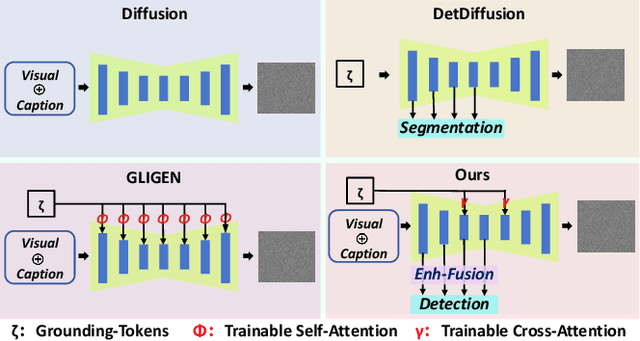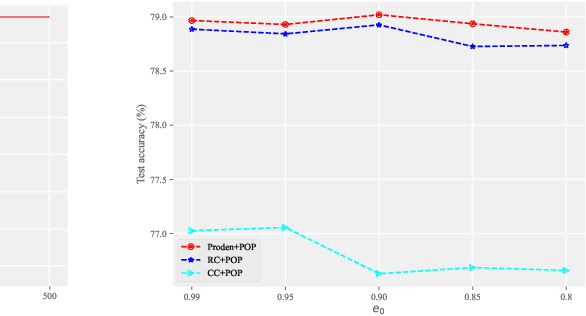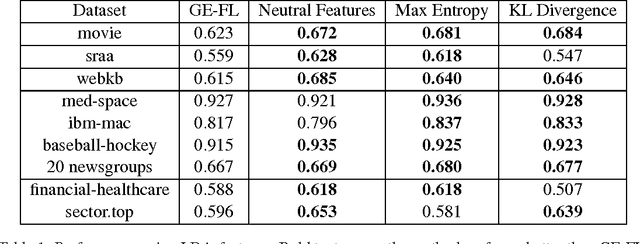Biao Liu
Positive-Unlabeled Reinforcement Learning Distillation for On-Premise Small Models
Jan 28, 2026Abstract:Due to constraints on privacy, cost, and latency, on-premise deployment of small models is increasingly common. However, most practical pipelines stop at supervised fine-tuning (SFT) and fail to reach the reinforcement learning (RL) alignment stage. The main reason is that RL alignment typically requires either expensive human preference annotation or heavy reliance on high-quality reward models with large-scale API usage and ongoing engineering maintenance, both of which are ill-suited to on-premise settings. To bridge this gap, we propose a positive-unlabeled (PU) RL distillation method for on-premise small-model deployment. Without human-labeled preferences or a reward model, our method distills the teacher's preference-optimization capability from black-box generations into a locally trainable student. For each prompt, we query the teacher once to obtain an anchor response, locally sample multiple student candidates, and perform anchor-conditioned self-ranking to induce pairwise or listwise preferences, enabling a fully local training loop via direct preference optimization or group relative policy optimization. Theoretical analysis justifies that the induced preference signal by our method is order-consistent and concentrates on near-optimal candidates, supporting its stability for preference optimization. Experiments demonstrate that our method achieves consistently strong performance under a low-cost setting.
SpatialLock: Precise Spatial Control in Text-to-Image Synthesis
Nov 06, 2025



Abstract:Text-to-Image (T2I) synthesis has made significant advancements in recent years, driving applications such as generating datasets automatically. However, precise control over object localization in generated images remains a challenge. Existing methods fail to fully utilize positional information, leading to an inadequate understanding of object spatial layouts. To address this issue, we propose SpatialLock, a novel framework that leverages perception signals and grounding information to jointly control the generation of spatial locations. SpatialLock incorporates two components: Position-Engaged Injection (PoI) and Position-Guided Learning (PoG). PoI directly integrates spatial information through an attention layer, encouraging the model to learn the grounding information effectively. PoG employs perception-based supervision to further refine object localization. Together, these components enable the model to generate objects with precise spatial arrangements and improve the visual quality of the generated images. Experiments show that SpatialLock sets a new state-of-the-art for precise object positioning, achieving IOU scores above 0.9 across multiple datasets.
PLPP: Prompt Learning with Perplexity Is Self-Distillation for Vision-Language Models
Dec 18, 2024Abstract:Pre-trained Vision-Language (VL) models such as CLIP have demonstrated their excellent performance across numerous downstream tasks. A recent method, Context Optimization (CoOp), further improves the performance of VL models on downstream tasks by introducing prompt learning. CoOp optimizes a set of learnable vectors, aka prompt, and freezes the whole CLIP model. However, relying solely on CLIP loss to fine-tune prompts can lead to models that are prone to overfitting on downstream task. To address this issue, we propose a plug-in prompt-regularization method called PLPP (Prompt Learning with PerPlexity), which use perplexity loss to regularize prompt learning. PLPP designs a two-step operation to compute the perplexity for prompts: (a) calculating cosine similarity between the weight of the embedding layer and prompts to get labels, (b) introducing a language model (LM) head that requires no training behind text encoder to output word probability distribution. Meanwhile, we unveil that the essence of PLPP is inherently a form of self-distillation. To further prevent overfitting as well as to reduce the additional computation introduced by PLPP, we turn the hard label to soft label and choose top-$k$ values for calculating the perplexity loss. For accelerating model convergence, we introduce mutual self-distillation learning, that is perplexity and inverted perplexity loss. The experiments conducted on four classification tasks indicate that PLPP exhibits superior performance compared to existing methods.
Negative-Prompt-driven Alignment for Generative Language Model
Oct 16, 2024Abstract:Large language models have achieved remarkable capabilities, but aligning their outputs with human values and preferences remains a significant challenge. Existing alignment methods primarily focus on positive examples while overlooking the importance of negative responses in guiding models away from undesirable behaviors. For instance, the widely-used alignment datasets reveals a scarcity of explicit negative examples that contradict human values, hindering its ability to discourage harmful or biased outputs during training. To address this limitation, we propose NEAT, i.e., NEgative-prompt-driven AlignmenT, to introduce negative prompts to generate undesirable responses alongside positive examples during the optimization process. NEAT explicitly penalizes the model for producing harmful outputs, guiding it not only toward desirable behaviors but also steering it away from generating undesirable, biased responses. This dual feedback mechanism enables better alignment with human preferences, crucial in contexts where avoiding harm is paramount. Starting from a pre-trained language model, NEAT performs online alignment by incorporating a ranking loss derived from an expanded preference dataset containing both positive and negative examples. Extensive experiments validate NEAT's effectiveness in significantly enhancing language models' alignment with human values and preferences.
Progressively Selective Label Enhancement for Language Model Alignment
Aug 05, 2024Abstract:Large Language Models have demonstrated impressive capabilities in various language tasks but may produce content that misaligns with human expectations, raising ethical and legal concerns. Therefore, it is important to explore the limitations and implement restrictions on the models to ensure safety and compliance, with Reinforcement Learning from Human Feedback (RLHF) being the primary method. Due to challenges in stability and scalability with the RLHF stages, researchers are exploring alternative methods to achieve effects comparable to those of RLHF. However, these methods often depend on large high-quality datasets and inefficiently utilize generated data. To deal with this problem, we propose PSLE, i.e., Progressively Selective Label Enhancement for Language Model Alignment, a framework that fully utilizes all generated data by guiding the model with principles to align outputs with human expectations. Using a dynamically updated threshold, our approach ensures efficient data utilization by incorporating all generated responses and weighting them based on their corresponding reward scores. Experimental results on multiple datasets demonstrate the effectiveness of PSLE compared to existing language model alignment methods.
Can Class-Priors Help Single-Positive Multi-Label Learning?
Sep 25, 2023Abstract:Single-positive multi-label learning (SPMLL) is a typical weakly supervised multi-label learning problem, where each training example is annotated with only one positive label. Existing SPMLL methods typically assign pseudo-labels to unannotated labels with the assumption that prior probabilities of all classes are identical. However, the class-prior of each category may differ significantly in real-world scenarios, which makes the predictive model not perform as well as expected due to the unrealistic assumption on real-world application. To alleviate this issue, a novel framework named {\proposed}, i.e., Class-pRiors Induced Single-Positive multi-label learning, is proposed. Specifically, a class-priors estimator is introduced, which could estimate the class-priors that are theoretically guaranteed to converge to the ground-truth class-priors. In addition, based on the estimated class-priors, an unbiased risk estimator for classification is derived, and the corresponding risk minimizer could be guaranteed to approximately converge to the optimal risk minimizer on fully supervised data. Experimental results on ten MLL benchmark datasets demonstrate the effectiveness and superiority of our method over existing SPMLL approaches.
Variational Label-Correlation Enhancement for Congestion Prediction
Aug 01, 2023Abstract:The physical design process of large-scale designs is a time-consuming task, often requiring hours to days to complete, with routing being the most critical and complex step. As the the complexity of Integrated Circuits (ICs) increases, there is an increased demand for accurate routing quality prediction. Accurate congestion prediction aids in identifying design flaws early on, thereby accelerating circuit design and conserving resources. Despite the advancements in current congestion prediction methodologies, an essential aspect that has been largely overlooked is the spatial label-correlation between different grids in congestion prediction. The spatial label-correlation is a fundamental characteristic of circuit design, where the congestion status of a grid is not isolated but inherently influenced by the conditions of its neighboring grids. In order to fully exploit the inherent spatial label-correlation between neighboring grids, we propose a novel approach, {\ours}, i.e., VAriational Label-Correlation Enhancement for Congestion Prediction, which considers the local label-correlation in the congestion map, associating the estimated congestion value of each grid with a local label-correlation weight influenced by its surrounding grids. {\ours} leverages variational inference techniques to estimate this weight, thereby enhancing the regression model's performance by incorporating spatial dependencies. Experiment results validate the superior effectiveness of {\ours} on the public available \texttt{ISPD2011} and \texttt{DAC2012} benchmarks using the superblue circuit line.
Progressive Purification for Instance-Dependent Partial Label Learning
Jun 02, 2022



Abstract:Partial label learning (PLL) aims to train multi-class classifiers from instances with partial labels (PLs)-a PL for an instance is a set of candidate labels where a fixed but unknown candidate is the true label. In the last few years, the instance-independent generation process of PLs has been extensively studied, on the basis of which many practical and theoretical advances have been made in PLL, whereas relatively less attention has been paid to the practical setting of instance-dependent PLs, namely, the PL depends not only on the true label but the instance itself. In this paper, we propose a theoretically grounded and practically effective approach called PrOgressive Purification (POP) for instance-dependent PLL: in each epoch, POP updates the learning model while purifying each PL for the next epoch of the model training by progressively moving out false candidate labels. Theoretically, we prove that POP enlarges the region appropriately fast where the model is reliable, and eventually approximates the Bayes optimal classifier with mild assumptions; technically, POP is flexible with arbitrary losses and compatible with deep networks, so that the previous advanced PLL losses can be embedded in it and the performance is often significantly improved.
Robustly Leveraging Prior Knowledge in Text Classification
Mar 03, 2015



Abstract:Prior knowledge has been shown very useful to address many natural language processing tasks. Many approaches have been proposed to formalise a variety of knowledge, however, whether the proposed approach is robust or sensitive to the knowledge supplied to the model has rarely been discussed. In this paper, we propose three regularization terms on top of generalized expectation criteria, and conduct extensive experiments to justify the robustness of the proposed methods. Experimental results demonstrate that our proposed methods obtain remarkable improvements and are much more robust than baselines.
 Add to Chrome
Add to Chrome Add to Firefox
Add to Firefox Add to Edge
Add to Edge